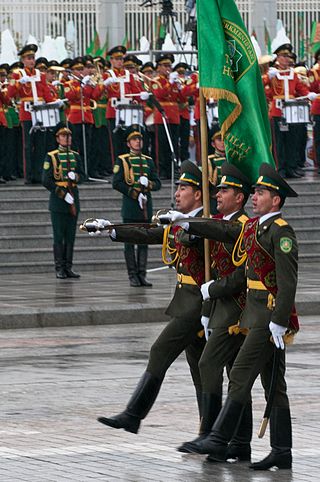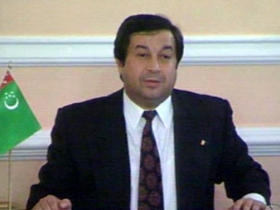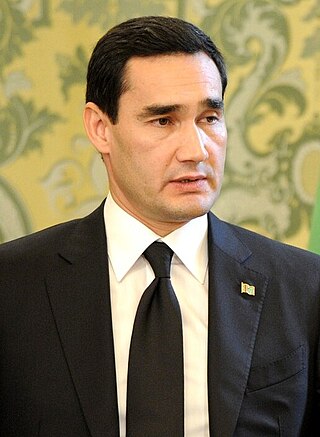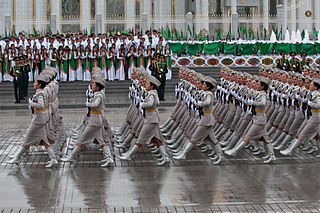
The history of Turkmenistan traditionally began with the arrival of Indo-European Iranian tribes around 2000 BC. Early tribes were nomadic or semi-nomadic due to the arid conditions of the region, preventing widespread adoption of agriculture. The steppe culture in Central Asia was an extension of a larger Eurasian series of horse cultures which spanned the entire spectrum of language families, including the Indo-Europeans and Turko-Mongol groups. Some of the known early Iranian tribes included the Massagatae, the Scythians/Sakas, and early Soghdians, who were most likely precursors of the Khwarezmians. Turkmenistan was a passing point for numerous migrations and invasions by tribes, which gravitated towards the settled regions of the south, including ancient Mesopotamia, Elam, and the Indus Valley civilization.

Ashgabat or Asgabat, formerly named Poltoratsk between 1919 and 1927, is the capital and the largest city of Turkmenistan. It lies between the Karakum Desert and the Kopetdag mountain range in Central Asia, near the Iran-Turkmenistan border. The city has a population of 1,030,063.

Turkmenistan is a country in Central Asia bordered by Kazakhstan to the northwest, Uzbekistan to the north, east and northeast, Afghanistan to the southeast, Iran to the south and southwest and the Caspian Sea to the west. Ashgabat is the capital and largest city. It is one of the six independent Turkic states. With a population of 6.5 million, Turkmenistan is the 35th most-populous country in Asia and has the lowest population of the Central Asian republics while being one of the most sparsely populated nations on the Asian continent.

The Ministry for National Security or MNS is the secret police agency for the government of Turkmenistan. It is composed largely of the remnants of KGB organs left over after the collapse of the Soviet Union; its functions remain largely the same as well. The MNB and the national police force are under the direction of the Ministry of Internal Affairs. Until 2002, it was known as the KNB.
Prior to the 2001 invasion of Afghanistan, the Islamic Movement of Uzbekistan (IMU) posed the greatest threat to the Karimov administration. In 2002 the IMU was reclassified as terrorist by the United States. Since the invasion, the IMU has been greatly weakened due to US military actions which cut off its supply of resources and killed its leader, Juma Namangani.

Boris Orazowiç Şyhmyradow is a Turkmen politician who served as the minister of foreign affairs of Turkmenistan from 1995 to 2000. He was sentenced to life imprisonment after he was convicted of participation in a plot against President Saparmyrat Nyýazow in 2002. Little is known about his life in prison, and it is unknown whether he remains alive.

The Central Asian Union (CAU), later called the Central Asian Economic Union, was an intergovernmental organization for economic integration between the Central Asian post-Soviet republics of Kazakhstan, Kyrgyzstan and Uzbekistan between 1994 and 2004. Tajikistan joined the Union in 1996 as an observer. Several proposals to restore the Union have been put forward since its dissolution.
The Turkmen of Turkmenistan, are predominantly Muslims. According the U.S. Department of State's International Religious Freedom Report for 2022,
According to U.S. government estimates, the country is 89 percent Muslim, 9 percent Eastern Orthodox, and 2 percent other. There are small communities of Jehovah's Witnesses, Shia Muslims, Baha’is, Roman Catholics, the International Society for Krishna Consciousness, and evangelical Christians, including Baptists and Pentecostals. Most ethnic Russians and Armenians identify as Orthodox Christian and generally are members of the Russian Orthodox Church or Armenian Apostolic Church. Some ethnic Russians and Armenians are also members of smaller Protestant groups. There are small pockets of Shia Muslims, consisting largely of ethnic Iranians, Azeris, and Kurds, some located in Ashgabat, with others along the border with Iran and in the western city of Turkmenbashy.

Turkmenistan – United States relations are bilateral relations between Turkmenistan and the United States.

The following outline is provided as an overview of and topical guide to Turkmenistan:

Russia–Turkmenistan relations are the bilateral relations between Russia and Turkmenistan. Russia has an embassy in Ashgabat and a consulate-general in Türkmenbaşy. Turkmenistan has an embassy in Moscow. In 1885 the modern-day Turkmenistani region became absorbed into the Russian Empire. After 1924 it became a Soviet Socialist Republic within the Soviet Union until declaring independence in 1991. The two nations have thus been mutually friendly for the past centuries.

Saparmurat Atayevich Niyazov, also known as Türkmenbaşy, was a Turkmen politician who ruled Turkmenistan from 1985 until his death in 2006. He was first secretary of the Turkmen Communist Party from 1985 until 1991 and supported the 1991 Soviet coup attempt. He continued to rule Turkmenistan for 15 years after independence from the Soviet Union in 1991.

Bilateral diplomatic relations exist between Armenia and Turkmenistan. Armenia has an embassy in Ashgabat. Turkmenistan has an embassy in Yerevan.

Belarus has an embassy in Ashgabat. Turkmenistan has an embassy in Minsk. Both countries are full members of the UN, and the OSCE. Belarus is a full member and Turkmenistan is associated with the CIS. Currently, the ambassador of Turkmenistan to Belarus is Murad Yazberdyev. The Belarusian Ambassador to Turkmenistan is Oleg Tabanyuhov.

French-Turkmen relations are the bilateral relations between France and Turkmenistan. France has an embassy in Ashgabat and Turkmenistan has an embassy in Paris. Both countries are full members of the OSCE and the United Nations.

Serdar Gurbangulyýewiç Berdimuhamedow is a Turkmen politician serving as the third and current president of Turkmenistan since 19 March 2022. Berdimuhamedow had previously served in several other positions within the government of his father, Gurbanguly, the long-standing authoritarian ruler of Turkmenistan. The father and son entered into a power-sharing arrangement in 2022 whereby they jointly rule an authoritarian system of government in Turkmenistan.
Magtymguly Avenue, transliterated from Russian as Makhtumkuli, is an avenue in Ashgabat, Turkmenistan. It is considered to be the longest and most prominent avenue in the capital

The Armed Forces of Turkmenistan currently funds 2 high ranking educational institutions: The Military Academy of Turkmenistan and the Military Institute of the Ministry of Defense of Turkmenistan. Aside from those two schools, there are several military schools around the country, specializing in the training of personnel of a branches of service. In the early 1990s when the armed forces were rapidly being developed, many officers were trained in the Russian Federation's Ministry of Defense, while at least 300 officers were sent to schools in Turkey. On 3 October 1992, the Turkmen State University created the first Turkmen educational department. This article lists institutions of the Turkmen Armed Forces based on its respective agency and service branch.
Turkmen State Border Service Institute is an educational institution that specializes in the training of personnel of the State Border Service of Turkmenistan and the Turkmen Border Troops. The institute is one of many Turkmen military academies based in Ashgabat.

Early presidential elections were held in Turkmenistan on 12 March 2022. The elections were called after incumbent president Gurbanguly Berdimuhamedow announced his intention to resign.



















